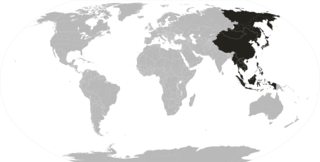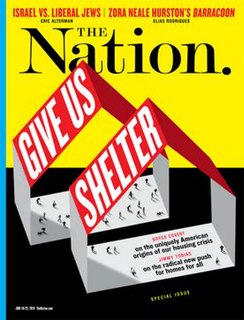
A cartoon is a type of illustration, sometimes animated, typically in a non-realistic or semi-realistic style. The specific meaning has evolved over time, but the modern usage usually refers to either: an image or series of images intended for satire, caricature, or humor; or a motion picture that relies on a sequence of illustrations for its animation. Someone who creates cartoons in the first sense is called a cartoonist, and in the second sense they are usually called an animator.

The Far East is a geographical region that includes the Russian Far East, Eastern and Southeastern Asia. South Asia is sometimes also included for economic and cultural reasons. The term "Far East" came into use in European geopolitical discourse in the 12th century, denoting the Far East as the "farthest" of the three "easts", beyond the Near East and the Middle East. Likewise, in Qing Dynasty of the 19th and early 20th centuries the term "Tàixī (泰西)" – i.e., anything further west than the Arab world – was used to refer to the Western countries.
A magazine is a periodical publication which is printed in gloss-coated and matte paper or electronically published. Magazines are generally published on a regular schedule and contain a variety of content. They are generally financed by advertising, by a purchase price, by prepaid subscriptions, or a combination of the three.
The Free World is a propaganda term, primarily used during the Cold War from 1945 to 1992, to refer to the Western Bloc. More broadly, it has also been used to refer to all non-communist countries. It has traditionally primarily been used to refer to the countries allied and aligned with the United States and to those affiliated with international organizations such as the North Atlantic Treaty Organization (NATO) and the European Union (EU). Critics have pointed out the contradiction between the use of the term and the fact of its being applied to all NATO members - even at times when some of them were ruled by military dictatorships as well as to various anti-Communist dictatorial regimes closely allied to the US.

The Economist is an international weekly newspaper printed in magazine-format and published digitally that focuses on current affairs, international business, politics, and technology. Based in London, England, the newspaper is owned by The Economist Group, with core editorial offices in the United States, as well as across major cities in continental Europe, Asia, and the Middle East. In August 2015, Pearson sold its 50 percent stake in the newspaper to the Italian Agnelli family's investment company, Exor, for £469 million and the paper re-acquired the remaining shares for £182 million. In 2019, their average global print circulation was over 909,476, while combined with their digital presence, runs to over 1.6 million. Across their social media platforms, it reaches an audience of 35 million, as of 2016. The newspaper has a prominent focus on data journalism and analysis over original reporting, to both criticism and acclaim.

Independence is a condition of a person, nation, country, or state in which its residents and population, or some portion thereof, exercise self-government, and usually sovereignty, over its territory. The opposite of independence is the status of a dependent territory.

Neoliberalism or neo-liberalism is the 20th-century resurgence of 19th-century ideas associated with economic liberalism and free-market capitalism. It is generally associated with policies of economic liberalization, including privatization, deregulation, globalization, free trade, austerity, and reductions in government spending in order to increase the role of the private sector in the economy and society; however, the defining features of neoliberalism in both thought and practice have been the subject of substantial scholarly debate. In policymaking, neoliberalism was part of a paradigm shift that followed the decline of the Keynesian consensus in economics to address the stagflation of the 1970s.
A political cartoon, a type of editorial cartoon, is a graphic with caricatures of public figures, expressing the artist's opinion. An artist who writes and draws such images is known as an editorial cartoonist. They typically combine artistic skill, hyperbole and satire in order to question authority and draw attention to corruption, political violence and other social ills.

The muckrakers were reform-minded journalists in the Progressive Era in the United States (1890s–1920s) who exposed established institutions and leaders as corrupt. They typically had large audiences in popular magazines. The modern term generally references investigative journalism or watchdog journalism; investigative journalists in the US are often informally called "muckrakers".

Reason is a libertarian magazine published monthly in the United States by the Reason Foundation. The magazine has a circulation of around 50,000 and was named one of the 50 best magazines in 2003 and 2004 by the Chicago Tribune.

The New-York Tribune was an American newspaper, first established in 1841 by editor Horace Greeley. Between 1842 and 1866, the newspaper bore the name New-York Daily Tribune. From the 1840s through the 1860s it was the dominant Whig Party and then Republican newspaper in the United States. The paper achieved a circulation of approximately 200,000 in the 1850s, making it the largest daily paper then in New York City. The Tribune's editorials were widely read, shared, and copied in other city newspapers, helping to shape national U.S. opinion. It was one of the first papers in the north to send reporters, correspondents, and illustrators to cover the campaigns of the American Civil War.

Vice is a Canadian-American magazine focused on lifestyle, arts, culture, and news/politics. Founded in 1994 in Montreal as an alternative punk magazine, the founders later launched the youth media company Vice Media, which consists of divisions including the printed magazine as well as a website, broadcast news unit, a film production company, a record label, and a publishing imprint. As of February 2018, the magazine's editor-in-chief is Ellis Jones.

The ruling class is the social class of a given society that decides upon and sets that society's political agenda.

Transatlantic relations refer to the historic, cultural, political, economic and social relations between countries on both side of the Atlantic Ocean. Sometimes it specifically means relationships between the Anglophone North American countries, and particular European countries or organizations, although other meanings are possible.
AFP most often refers to:
Taki's Magazine, called Takimag for short, is an online magazine of politics and culture published by the Greek paleoconservative journalist and socialite Taki Theodoracopulos and edited by his daughter Mandolyna Theodoracopulos. Initially called Taki's Top Drawer, the site was redesigned and relaunched under its current title in March 2008 with a subsequent redesign in 2010. The website is sympathetic to the far-right. It received criticism in 2013 after it published articles in support of the Greek neo-Nazi political party Golden Dawn.
Liberalism is a political and moral philosophy based on liberty, consent of the governed and equality before the law. Liberals espouse a wide array of views depending on their understanding of these principles, but they generally support free markets, free trade, limited government, individual rights, capitalism, democracy, secularism, gender equality, racial equality, internationalism, freedom of speech, freedom of the press and freedom of religion. Yellow is the political colour most commonly associated with liberalism.

The Nation is the oldest continuously published weekly magazine in the United States, covering liberal political and cultural news, opinion, and analysis. It was founded on July 6, 1865, as a successor to William Lloyd Garrison's The Liberator, an abolitionist newspaper that closed in 1865, after ratification of the Thirteenth Amendment to the United States Constitution. Now that the specific, urgent problem of slavery had been ended, one could proceed to a broader topic, The Nation. An important collaborator of the new magazine was its Literary Editor Wendell Phillips Garrison, son of William. He had at his disposal his father's vast network of contacts.











